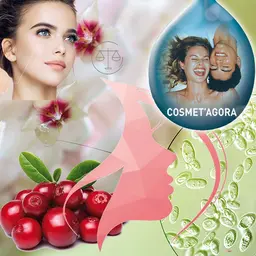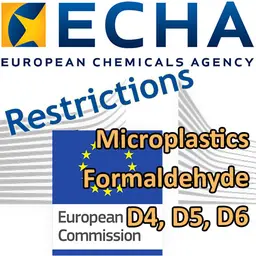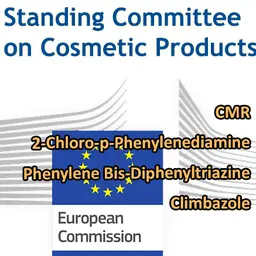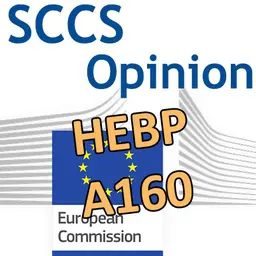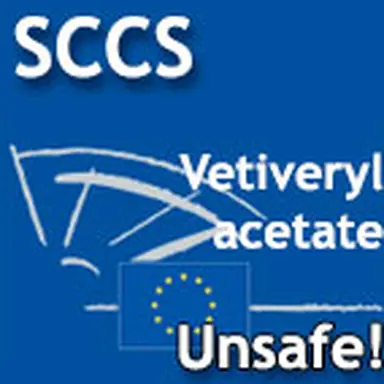
During its meeting on 16 December 2014, the SCCS has adopted its Opinion on Vetiveryl acetate. Conclusion: inadequate data which not allow a safety assessment, a genotoxic potential… the substance in not safe for use in cosmetic products.
Background
Vetiveryl acetate (CAS : 62563-80-8/84082-84-8/117-98-6) has a long history of widespread use as a woody note in perfumery.
The Scientific Committee on Consumer Products (SCCP) adopted at its 7th plenary meeting the 28 of March 2006 the opinion on Vetiveryl acetate (sensitization only) with the following conclusion:
The SCCP is of the opinion that the information submitted is inadequate to assess the safe use of the substance.
In June 2013 the Commission has received an update dossier by the International Fragrance Association (IFRA) on the safety assessment of Vetiveryl acetate. This submission is intended to demonstrate the safety of the ingredient when used as fragrance ingredient in cosmetic leave-on and rinse-off type products.
For exhaustive background information, see the article
•
Fragrances, Hair dyes: 5 requests for Opinions by the SCCS
(September 25, 2013).
Opinion
The main concern with the safety assessment of the fragrance ‘Vetiveryl acetate’ is that it is a mixture of many different constituents and that the composition of the fragrance will vary considerably depending on the origin of the grass Vetiveria zizaniodes from which the crude vetiver oil is derived, as well as the different manufacturing processes of the fragrance from the vetiver oil.
In the absence of knowledge of the composition of the test substances used in the submitted studies, the relevance of test results is questionable.
1. On the basis of currently available information, does the SCCS consider Vetiveryl acetate safe for use as fragrance ingredient in cosmetic leave-on and rinse-off type products in a concentration limit(s) according to the ones set up by IFRA?
In the previous Opinion on Vetiveryl acetate, the SCCP was of the opinion that the information submitted was inadequate to assess the safe use of the substance. Before further consideration, information such as characterisation of the test substance and clarification on purity and impurities was required (SCCP/0984/06).
Based on the newly submitted studies, the safety of Vetiveryl acetate on the market cannot be evaluated as only partial and insufficient information on the composition of Vetiveryl acetate on the market has been reported and as no information has been provided on the composition of the test substances used in the submitted toxicological studies.
Adequate information regarding chemical characterisation and quantification of constituents of ‘Vetiveryl acetate’ on the market, including the concentration range of the constituents, is required. Furthermore, documentation and justification is required to allow judgement on whether the test substances used in the submitted toxicological studies can be considered representative for what is considered as ‘Vetiveryl acetate’ on the market.
2. Does the SCCS have any further scientific concerns with regard to the use of Vetiveryl acetate as fragrance ingredient in cosmetic leave-on and rinse-off type products?
Based on the available data, there is evidence that Vetiveryl acetate has skin and eye irritation potential and is a moderate skin sensitiser. Concern was raised in the previous opinion (SCCP/0984/06) that Vetiveryl acetate may also have a phototoxic potential; however, based on the submitted data, the photosensitising / photo-irritation and phototoxic potential of the test substances cannot be evaluated.
Genotoxicity data are inadequate to exclude the genotoxic/mutagenic effects of Vetiveryl acetate which were observed in an Ames test. There was no justification for the use of alpha-tocopherol. New data on genotoxicity of Vetiveryl acetate without inclusion of alpha-tocopherol need to be provided.
On the basis of the inadequate data provided, a reliable safety assessment cannot be performed whether Vetiveryl acetate on the market is safe for use in cosmetics at the concentration limits proposed by the IFRA. However, due to the major concern of genotoxicity the SCCS considers Vetiveryl acetate unsafe as a cosmetic ingredient.
Deadline for comments
19 February 2015.
Further information
• Full text of
Opinion on the Vetiveryl acetate, SCCS/1541/14, 16 December 2014
.



